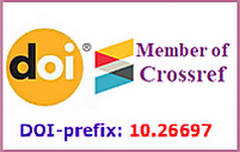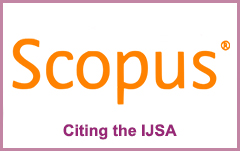Kgasi M. R. 1, Chimbo B. 1, Motsi L. 1
| 1 University of South Africa, South Africa |
Abstract
Background and Aim of Study: The prevalence of chronic diseases like diabetes has caused unmeasurable strain on many health systems especially in developing countries. Chronically ill patients are traumatised by their incurable illnesses, which adversely affects their adherence to their medical treatment, resulting in serious complications and even death. The aim of the study: to implement an intervention mobile health (mHealth) system by integrating persuasive technologies into mobile applications to empower diabetic patients to adhere to medical prescriptions.
Material and Methods: Fogg Behaviour Model (FBM) was leveraged for the integration of mHealth and behaviour aspects. The system was developed with Kotlin programming using the Android Studio working integrated development environment (IDE). Tools including Firebase Real Time Database, Android Studio and Android Mobile Phone were used to afford a fully fledged mHealth self-monitoring system. The system was evaluated using descriptive statistics by medical personnel and social workers to determine the completeness, clarity, logical arrangement, correctness, reliability, usability, as well as content validity.
Results: Findings indicated that the mHealth system meets a good degree of the measures that inform patients’ self-monitoring for medicine adherence. The evaluation results also suggested that some functionality of the mHealth self-monitoring system requires an incremental improvement, to provide a seamless healthcare support. The artefact was descriptively evaluated on seven parameters: completeness that showed a mean of 3.75 with a standard deviation of 1.070; functionality with a mean of 4.05 and standard deviation of 0.945; accuracy with a mean of 3.70 and standard deviation of 1.031; reliability a mean of 3.90 and standard deviation of 0.945; consistence a mean of 4.00 and standard deviation of 0.968; performance a mean of 3.75 and standard deviation of 1.250, and usability with a mean of 3.55 and standard deviation of 0.999.
Conclusions: The developed system is as effective as face-to-face consultations and personal visits to healthcare facilities. Diabetic patients need to adhere to medicine to avoid further complications that could lead to death.
Keywords
diabetes, mHealth, self-monitoring, medical adherence, persuasive technology, chronic diseases, remote healthcare provision
References
Achoki, T., Sartorius, B., & Watkins, D. (2022). Health trends, inequalities and opportunities in South Africa’s provinces, 1990-2019: Findings from the Global Burden of Disease 2019 Study. Journal of Epidemiol Community Health, 76(5), 471–481. https://doi.org/10.1136/jech-2021-217480
Arsenijevic, J., Tummers, L., & Bosma, N. (2020). Adherence to electronic health tools among vulnerable groups: Systematic literature review and meta-analysis. Journal of Medical Internet Research, 22(2). https://doi.org/10.2196/11613
Bacelar-Silva, G. M., Cox III, J. F., & Rodrigues, P. P. (2022). Outcomes of managing healthcare services using the Theory of Constraints: A systematic review. Health Systems, 11(1), 1–16. https://doi.org/10.1080/20476965.2020.1813056
Chang, Y. T., Tu, Y. Z., Chiou, H. Y., Lai, K. & Yu, N. C. (2022). Real-world benefits of diabetes management app use and self-monitoring of blood glucose on glycemic control: Retrospective analyses. Journal of Medical Internet Research, Mhealth Uhealth, 10(6), https://doi.org/10.2196/31764
Chatterjee, S. (2019). Can “persuasive technology” change behavior and help people better manage chronic diseases? Medical Xpress. https://medicalxpress.com/news/2018-10-persuasive-technology-behavior-people-chronic.html
Chifu, V. R., Pop, C. B., Demjen, D., Socaci, R., Todea, D., Antal, M., Cioara, T., Anghel, I., & Antal, C. (2022). Identifying and Monitoring the daily routine of seniors living at home. Sensors (Basel), 22(3), Article 992. https://doi.org/10.3390/s22030992
Cruz-Ramos, N. A., Alor-Hernández, G., Colombo-Mendoza, L. O., Sánchez-Cervantes, J. L., Rodríguez-Mazahua, L., & Guarneros-Nolasco, L. R. (2022). mhealth apps for self-management of cardiovascular diseases: A scoping review. Healthcare, 10(322). https://doi.org/10.3390/healthcare10020322
Debon, R., Coleonea, J. D., Bellei, E. A., & De Marchi, A. C. B. (2019). Mobile health applications for chronic diseases: A systematic review of features for lifestyle improvement. Diabetes & Metabolic Syndrome: Clinical Research & Reviewer, 13(4), 2507–2512 https://doi.org/10.1016/j.dsx.2019.07.016
de Leeuwerk, M. E., Botjes, M., van Vliet, V., Geleijn, E., de Groot, V., van Wegen, E., van der Schaaf, M., Tuynman, J., Dickhoff, C., & van der Leeden, M. (2022). Self-monitoring of physical activity after hospital discharge in patients who have undergone gastrointestinal or lung cancer surgery: Mixed methods feasibility study. JMIR Cancer, 8(2): e35694. https://doi.org/10.2196/35694
Dobson, R., Whittaker, R., Murphy, R., Khanolkar, M., Miller, S., Naylor, J., & Maddison, R. (2017). The use of mobile health to deliver self-management support to young people with type 1 diabetes: A cross-sectional survey. JMIR Diabetes, 2(1), 1–9, https://doi.org/10.2196/diabetes.7221
Fogg, B. J. (2009). A behavior model for persuasive design. Persuasive '09: Proceedings of the 4th International Conference on Persuasive Technology, Article 40. https://doi.org/10.1145/1541948.1541999
Fogg, B. J. (2002). Persuasive technology: Using computers to change what we think and do. Ubiquity, 2002, Article 5. https://doi.org/10.1145/764008.763957
Fogg, B. J. (2020). Tiny habits: The small changes that change everything. Houghton Mifflin Harcourt. https://st.catalog.lionlibraries.org/Record/.b26221317
Franklin, B. D., Abel, G. & Shojania, K. G. (2020). Medication non-adherence: an overlooked target for quality improvement interventions. BMJ Quality & Safety, 29, 271–273, https://doi.org/10.1136/bmjqs-2019-009984
Hevner, A.R. (2007). A three cycle view of design science research. Scandinavian Journal of Information Systems, 19(2), 87–92. https://aisel.aisnet.org/sjis/vol19/iss2/4
Huberty, J., Eckert, R., Larkey, L., Kurka, J., Rodríguez, De Jesús, S.A., Yoo, W., & Mesa, R. (2019). Smartphone-based meditation for myeloproliferative neoplasm patients: Feasibility study to inform future trials. JMIR Formative Research, 3(2): e12662, https://doi.org/10.2196/preprints.12662
Huzooree, G., Khedo, K. K., & Joonas, N. (2019). Pervasive mobile healthcare systems for chronic disease monitoring. Health Informatics Journal, 25(2), 267–291, https://doi.org/10.1177/1460458217704250
Istepanian, R. S., & Al-Anzi, T. M. (2018). m-Health interventions for diabetes remote monitoring and self-management clinical and compliance issues. mHealth, 4, Article 4. https://doi.org/10.21037/mhealth.2018.01.02
Jia, G., Yang, P., Zhou, J., Zhang, H., Lin, C., Chen, J., Cai, G., Yan, & Ning, G. A. (2015). A framework design for the mHealth system for self-management promotion. Bio-Medical Materials and Engineering, 26(S1), S1731–1740. https://doi.org/10.3233/BME-151473
Kalema, B., M., & Mosoma, R.M. (2019). Mobile Health monitoring systems model for chronic diseases patients in developing countries. 2019 IEEE 10th Annual Information Technology, Electronics and Mobile Communication Conference (IEMCON), Vancouver, BC, Canada, 2019, (pp. 0820–0826). https://doi.org/10.1109/IEMCON.2019.8936181
Kendzerska, T., Zhu, D. T., Gershon, A. S, Edwards, J. D., Peixoto, C., Robillard, R., & Kendall, C. E. (2021). The effects of the health system response to the COVID-19 pandemic on chronic disease management: A narrative review. Risk Management and Healthcare Policy, 14, 575–668. https://doi.org/10.2147/RMHP.S293471
Kgasi, M., Chimbo, B., & Motsi, L. (2023). mHealth self-monitoring model for medicine adherence of diabetic patients in developing countries: A structural equation modelling approach. JMIR Formative Research, 7, Article e49407. https://doi.org/10.2196/49407
Köhler, N., Mehnert, A., & Götze, H. (2017). Psychological distress, chronic conditions and quality of life in elderly hematologic cancer patients: Study protocol of a prospective study. BMC Cancer, 17, Article 700. https://doi.org/10.1186/s12885-017-3662-1
Lagan, S., Sandler, L., & Torous, J. (2021). Evaluating evaluation frameworks: A scoping review of frameworks for assessing health apps. BMJ Open, 11(3), Article e047001. https://doi.org/10.1136/bmjopen-2020-047001
Larbi, D., Bradway, M., Randine, P., Antypas, K., Gabarron, E., & Arsand, E. (2019). Do diabetes mHealth and online interventions evaluate what is important for users? Linköping Electronic Conference Proceedings, 161, 30–36. https://hdl.handle.net/11250/2828921
Lin, Y., K., Richardson, C., Dobrin. I., Pop-Busui, R., Piatt, G., & Piette, J. (2022). Accessibility and openness to diabetes management support with mobile phones: Survey study of people with type 1 diabetes using advanced diabetes technologies. JMIR Diabetes, 7(2), Article e36140. https://doi.org/10.2196/36140
Mueller, S. M., Jungo, P., Cajacob, L., Schwegler, S., Itin, P., & Brandt, O. (2019). The absence of evidence is evidence of non-sense: Cross-sectional study on the quality of psoriasis-related videos on YouTube and their reception by health seekers. Journal of medical Internet research, 21(1), Article e11935. https://doi.org/10.2196/11935
Nass, C. I., Fogg, B. J., & Moon, Y. (1996). Can computers be teammates? Affiliation and social identity effects in human-computer interaction. International Journal of Human-Computer Studies, 45(6), 669–678. https://doi.org/10.1006/ijhc.1996.0073
Prioleau, T. (2021). Learning from the experiences of COVID-19 survivors: Web-based survey study. JMIR Formative Research, 5(5), Article e23009, https://doi.org/10.2196/23009
Pypenko, I. S. (2019). Digital product: The essence of the concept and scopes. International Journal of Education and Science, 2(4), 56. https://doi.org/10.26697/ijes.2019.4.41
Pypenko, I. S., & Melnyk, Yu. B. (2021). Principles of digitalisation of the state economy. International Journal of Education and Science, 4(1), 42–50. https://doi.org/10.26697/ijes.2021.1.5
Reidy, C., Foster, C., & Rogers, A. (2020). A facilitated web-based self-management tool for people with type 1 diabetes using an insulin pump: Intervention development using the behavioural change wheel and theoretical domains framework. Journal of Medical Internet Research, 22(7), Article e21381. https://doi.org/10.2196/21381
Rensburg, R. (2021). Healthcare in South Africa: How inequity is contributing to inefficiency. The Conversation. https://theconversation.com/healthcare-in-south-africa-how-inequity-is-contributing-to-inefficiency-163753
Shaw, R.J., Yang, Q., Barnes, A., Hatch, D., Crowley, M. J., Vorderstrasse, A., Vaughn, J., Diane, A., Lewinski, A. A., Jiang, M., Stevenson, J., & Steinberg, D. (2020). Self-monitoring diabetes with multiple mobile health devices. Journal of the American Medical Informatics Association, 27(5), 667–676. https://doi.org/10.1093/jamia/ocaa007
World Health Organisation. (2021). Classification of self-care interventions for health: A shared language to describe the uses of self-care interventions. https://iris.who.int/bitstream/handle/10665/350480/9789240039469-eng.pdf?sequence=1
World Health Organization. (2023, April 5). Diabetes. https://www.who.int/news-room/fact-sheets/detail/diabetes
Yagiz, J. I., & Goderis, G. (2022). The impact of the COVID-19 pandemic on eHealth use in the daily practice and life of Dutch-speaking, General Practitioners in Belgium: Qualitative Study With Semi structured Interviews JMIR Formative Research, 6(11), Article e41847. https://doi.org/10.2196/41847
Kgasi Mmamolefe Rosina (Corresponding Author) – https://orcid.org/0009-0006-7366-9196;
Chimbo Bester – https://orcid.org/0000-0003-1916-0090; Doctor of Philosophy in Information Systems, Professor, University of South Africa, Johannesburg, South Africa.
Motsi Lovemore – https://orcid.org/0000-0002-2149-7429; Doctor of Philosophy in Information Systems, Professor, University of South Africa, Johannesburg, South Africa.
| |
APA
Kgasi, M. R., Chimbo, B., & Motsi, L. (2024). A persuasive technology mhealth self-monitoring system for intervention in diabetic patients medical adherence. International Journal of Science Annals, 7(2), 76–86. https://doi.org/10.26697/ijsa.2024.2.2
Harvard
Kgasi, M. R., Chimbo, B., & Motsi, L. "A persuasive technology mhealth self-monitoring system for intervention in diabetic patients medical adherence". International Journal of Science Annals, [online] 7(2), pp. 76–86. viewed 25 December 2024, https://culturehealth.org/ijsa_archive/ijsa.2024.2.2.pdfVancouver
Kgasi M. R., Chimbo B., Motsi L. A persuasive technology mhealth self-monitoring system for intervention in diabetic patients medical adherence.. International Journal of Science Annals [Internet]. 2024 [cited 25 December 2024]; 7(2): 76–86. Available from: https://culturehealth.org/ijsa_archive/ijsa.2024.2.2.pdf https://doi.org/10.26697/ijsa.2024.2.2











